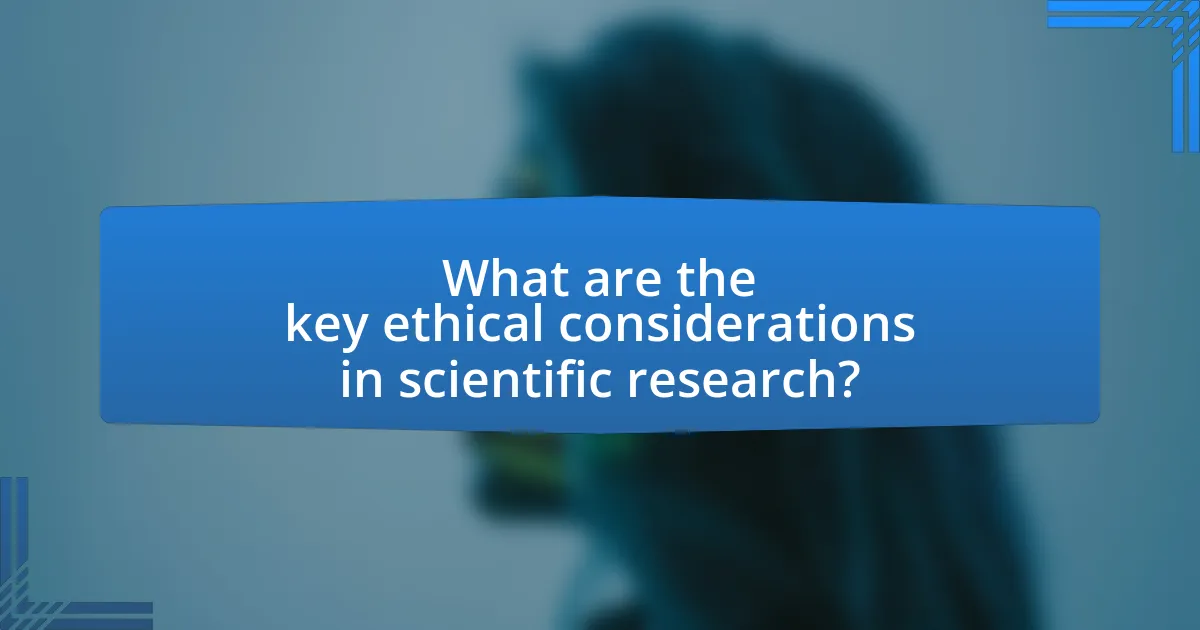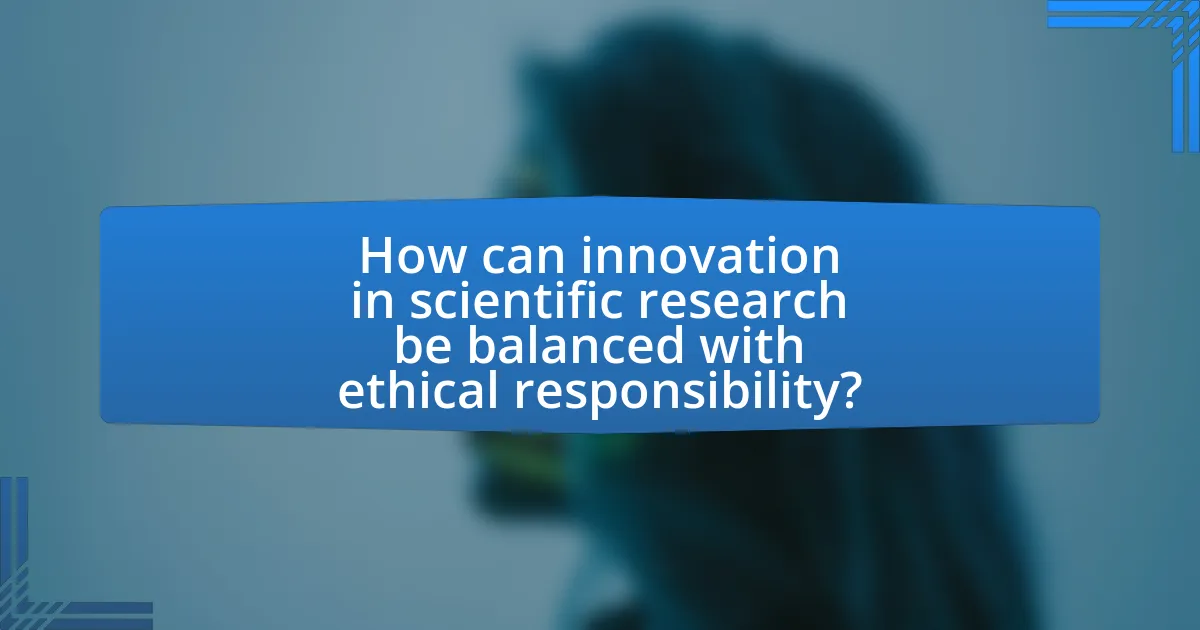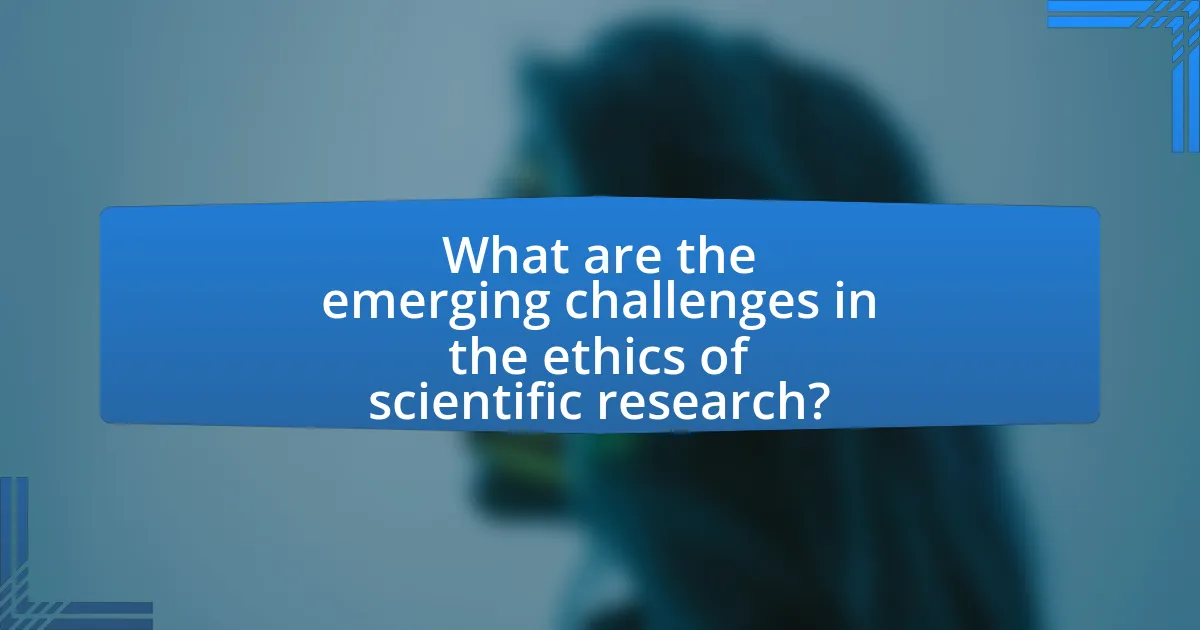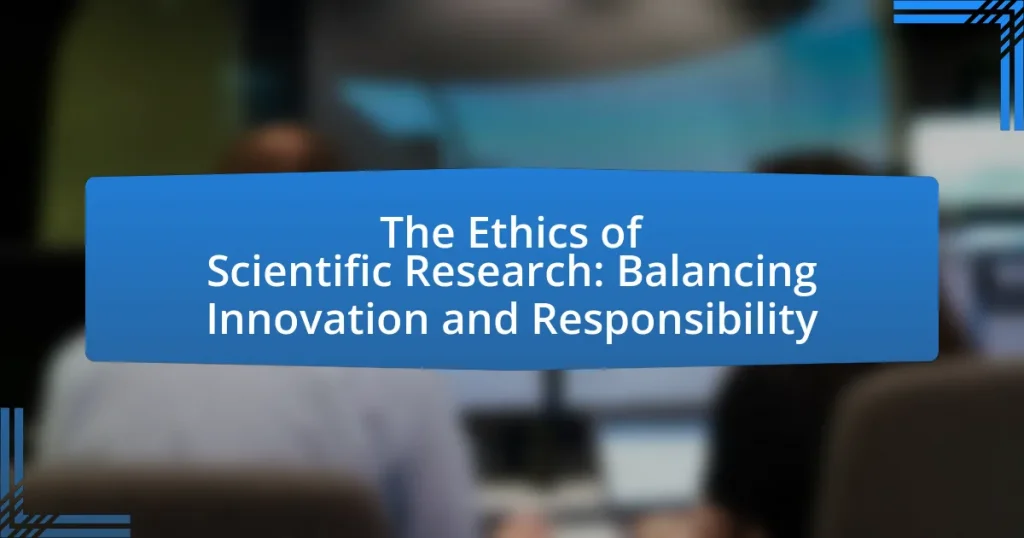The article examines the ethics of scientific research, emphasizing the importance of balancing innovation with ethical responsibility. Key ethical considerations include informed consent, integrity, and the welfare of research subjects, which are foundational principles outlined in documents such as the Belmont Report and the Declaration of Helsinki. The discussion highlights how ethical principles guide scientific inquiry across various fields, the role of peer review in maintaining research integrity, and the challenges posed by emerging technologies. Additionally, it addresses the implications of globalization and cultural diversity on ethical standards, providing strategies for researchers to navigate ethical dilemmas and promote a culture of ethical awareness in their work.

What are the key ethical considerations in scientific research?
The key ethical considerations in scientific research include informed consent, integrity, and the welfare of research subjects. Informed consent ensures that participants understand the nature of the research and voluntarily agree to participate, which is crucial for respecting autonomy. Integrity involves conducting research honestly and transparently, avoiding fabrication or falsification of data, as emphasized by the American Psychological Association’s Ethical Principles of Psychologists and Code of Conduct. The welfare of research subjects, whether human or animal, mandates minimizing harm and maximizing benefits, as outlined in the Belmont Report, which establishes ethical principles and guidelines for research involving human subjects. These considerations are essential for maintaining public trust and advancing scientific knowledge responsibly.
How do ethical principles guide scientific inquiry?
Ethical principles guide scientific inquiry by establishing standards for integrity, accountability, and respect for human and animal rights. These principles ensure that research is conducted responsibly, minimizing harm and maximizing benefits. For instance, the Declaration of Helsinki outlines ethical guidelines for medical research involving human subjects, emphasizing informed consent and the necessity of risk-benefit analysis. Adhering to these ethical standards fosters public trust in scientific findings and promotes the responsible use of research outcomes, ultimately contributing to the advancement of knowledge while safeguarding societal values.
What are the fundamental ethical principles in research?
The fundamental ethical principles in research are respect for persons, beneficence, and justice. Respect for persons involves acknowledging the autonomy of individuals and protecting those with diminished autonomy, ensuring informed consent is obtained. Beneficence requires researchers to maximize benefits and minimize harm to participants, as outlined in the Belmont Report, which emphasizes the importance of ethical considerations in research involving human subjects. Justice pertains to the fair distribution of research benefits and burdens, ensuring that no particular group is unfairly targeted or excluded from participation. These principles are foundational in guiding ethical research practices and protecting the rights and welfare of participants.
How do these principles apply to different fields of science?
The principles of ethics in scientific research apply across various fields by guiding researchers to conduct their work responsibly and with integrity. In biomedical research, for instance, ethical principles ensure that human subjects are treated with respect and that informed consent is obtained, as mandated by the Declaration of Helsinki. In environmental science, ethical considerations involve the responsibility to protect ecosystems and biodiversity, which is highlighted in the Convention on Biological Diversity. In social sciences, ethical principles emphasize the importance of confidentiality and the welfare of participants, as outlined in the American Psychological Association’s Ethical Principles. These applications demonstrate that ethical guidelines are essential for maintaining public trust and ensuring the responsible advancement of knowledge in all scientific disciplines.
Why is informed consent crucial in scientific research?
Informed consent is crucial in scientific research because it ensures that participants are fully aware of the nature, risks, and benefits of the study before agreeing to participate. This ethical requirement protects individual autonomy and promotes trust between researchers and participants. According to the Belmont Report, informed consent is a fundamental principle that upholds respect for persons, which is essential for ethical research practices. By obtaining informed consent, researchers demonstrate their commitment to ethical standards and the rights of participants, thereby fostering a responsible research environment.
What does informed consent entail for participants?
Informed consent for participants entails a clear understanding of the research study, including its purpose, procedures, risks, benefits, and the right to withdraw at any time without penalty. This process ensures that participants voluntarily agree to participate based on comprehensive information. According to the Belmont Report, informed consent is a fundamental ethical requirement in research involving human subjects, emphasizing respect for persons, beneficence, and justice.
How can researchers ensure participants are adequately informed?
Researchers can ensure participants are adequately informed by providing clear, comprehensive, and accessible information about the study’s purpose, procedures, risks, and benefits. This can be achieved through well-structured informed consent documents that are written in plain language, allowing participants to understand what their involvement entails. Additionally, researchers should engage in open dialogue, encouraging questions and providing answers to clarify any uncertainties. Studies have shown that effective communication enhances participants’ understanding and retention of information, which is crucial for ethical research practices. For instance, a study published in the Journal of Medical Ethics found that participants who received detailed explanations and had opportunities to ask questions were more likely to feel informed and comfortable with their participation.
What role does peer review play in maintaining research integrity?
Peer review plays a critical role in maintaining research integrity by ensuring that scientific work undergoes rigorous evaluation by experts in the field before publication. This process helps to identify errors, biases, and methodological flaws, thereby enhancing the credibility and reliability of research findings. Studies have shown that peer-reviewed articles are more likely to be accurate and trustworthy, as they are scrutinized for quality and adherence to ethical standards. For instance, a 2019 analysis published in the journal “PLOS ONE” found that peer-reviewed research is less likely to contain significant errors compared to non-peer-reviewed work, reinforcing the importance of this process in upholding the integrity of scientific literature.
How does peer review contribute to the credibility of scientific findings?
Peer review enhances the credibility of scientific findings by subjecting research to evaluation by experts in the field before publication. This process ensures that the methodology, data analysis, and conclusions are scrutinized for accuracy and validity, reducing the likelihood of errors and biases. Studies have shown that peer-reviewed articles are more likely to be reliable, as they undergo rigorous assessment, which can include multiple rounds of feedback and revisions. For instance, a 2017 analysis published in the journal “PLOS ONE” found that peer-reviewed research is generally more reproducible than non-peer-reviewed studies, highlighting the importance of this process in maintaining scientific integrity.
What are the limitations of the peer review process?
The peer review process has several limitations, including potential bias, lack of transparency, and variability in reviewer expertise. Bias can arise from personal relationships or conflicts of interest, leading to unfair evaluations. Lack of transparency often results in reviewers remaining anonymous, which can hinder accountability and constructive feedback. Additionally, the expertise of reviewers can vary significantly, affecting the quality of the review and potentially allowing flawed research to be published. Studies have shown that these limitations can impact the integrity of scientific literature, as evidenced by instances of retracted papers due to inadequate peer review.

How can innovation in scientific research be balanced with ethical responsibility?
Innovation in scientific research can be balanced with ethical responsibility by implementing rigorous ethical review processes and fostering a culture of accountability among researchers. Ethical review boards assess research proposals to ensure they meet established ethical standards, protecting human and animal subjects while promoting responsible innovation. For instance, the Belmont Report outlines key ethical principles such as respect for persons, beneficence, and justice, which guide research practices. Furthermore, ongoing education in ethics for researchers can enhance awareness and adherence to ethical standards, ensuring that innovation does not compromise ethical considerations.
What are the potential risks of prioritizing innovation over ethics?
Prioritizing innovation over ethics can lead to significant risks, including harm to individuals, societal backlash, and long-term reputational damage. When organizations focus solely on rapid advancements, they may overlook ethical considerations, resulting in products or technologies that compromise safety or privacy. For instance, the development of facial recognition technology has raised concerns about surveillance and discrimination, highlighting the potential for misuse when ethical guidelines are not prioritized. Additionally, historical examples, such as the Tuskegee Syphilis Study, demonstrate how neglecting ethical standards can lead to severe human rights violations and loss of public trust in scientific research. These risks underscore the necessity of integrating ethical frameworks into the innovation process to ensure responsible advancements.
How can researchers identify and mitigate these risks?
Researchers can identify and mitigate risks in scientific research by implementing comprehensive risk assessment frameworks and adhering to ethical guidelines. Risk assessment frameworks, such as the one proposed by the National Institutes of Health, involve systematic evaluation of potential ethical, legal, and social implications associated with research activities. By conducting thorough literature reviews and engaging with stakeholders, researchers can pinpoint specific risks related to their work.
To mitigate these risks, researchers can establish oversight committees, such as Institutional Review Boards, which ensure compliance with ethical standards and protect participant rights. Additionally, training programs on ethical research practices can enhance awareness and preparedness among researchers. Evidence shows that institutions with robust ethical training programs report fewer ethical breaches, highlighting the effectiveness of proactive measures in risk mitigation.
What examples illustrate the consequences of ethical oversights in research?
Examples illustrating the consequences of ethical oversights in research include the Tuskegee Syphilis Study and the Stanford prison experiment. The Tuskegee Syphilis Study, conducted from 1932 to 1972, involved the unethical treatment of African American men who were misled about their syphilis diagnosis and denied treatment, leading to severe health consequences and a lasting mistrust in medical institutions among African American communities. The Stanford prison experiment, conducted in 1971, demonstrated the psychological harm inflicted on participants due to a lack of ethical oversight, resulting in emotional distress and ethical debates about the treatment of human subjects in psychological research. These cases highlight the critical need for ethical standards in research to protect participants and maintain public trust.
How can ethical frameworks be integrated into research practices?
Ethical frameworks can be integrated into research practices by establishing clear guidelines that prioritize integrity, transparency, and accountability. Researchers should adopt ethical review processes, such as Institutional Review Boards (IRBs), to evaluate the potential impact of their work on participants and society. Additionally, training programs on ethical standards and practices can be implemented to ensure that all team members understand their responsibilities. Evidence from studies, such as the 2017 report by the National Academies of Sciences, Engineering, and Medicine, highlights that ethical training improves compliance and fosters a culture of ethical awareness in research environments.
What are some established ethical frameworks used in research?
Established ethical frameworks used in research include the Belmont Report, the Declaration of Helsinki, and the Nuremberg Code. The Belmont Report outlines principles such as respect for persons, beneficence, and justice, which guide ethical research involving human subjects. The Declaration of Helsinki, developed by the World Medical Association, emphasizes the importance of informed consent and the welfare of research participants. The Nuremberg Code, established after World War II, sets forth ethical standards for conducting research, particularly regarding voluntary consent and the necessity of avoiding harm. These frameworks are foundational in ensuring ethical conduct in research practices globally.
How can researchers apply these frameworks in their work?
Researchers can apply ethical frameworks in their work by integrating principles such as integrity, transparency, and accountability into their research processes. For instance, they can establish clear protocols for data management and sharing, ensuring that all findings are reported honestly and without fabrication. This approach is supported by the American Psychological Association’s Ethical Principles of Psychologists and Code of Conduct, which emphasizes the importance of ethical standards in maintaining public trust and advancing scientific knowledge. By adhering to these frameworks, researchers not only enhance the credibility of their work but also contribute to a culture of ethical responsibility in the scientific community.
What strategies can researchers employ to promote ethical research culture?
Researchers can promote an ethical research culture by implementing comprehensive training programs on research ethics. These programs should cover topics such as informed consent, data integrity, and responsible authorship, ensuring that all team members understand their ethical obligations. Evidence from the National Institutes of Health indicates that institutions with robust ethics training see a significant reduction in research misconduct incidents. Additionally, establishing clear ethical guidelines and fostering an environment of open communication encourages researchers to discuss ethical dilemmas without fear of retribution. Regularly reviewing and updating these guidelines based on current ethical standards further reinforces a commitment to ethical practices in research.
How can institutions support ethical research practices?
Institutions can support ethical research practices by implementing comprehensive training programs on research ethics for all researchers. These programs educate researchers about ethical standards, informed consent, and the importance of integrity in research. For example, the National Institutes of Health (NIH) mandates that all researchers funded by them complete training in responsible conduct of research, which reinforces ethical guidelines and accountability. Additionally, institutions can establish clear policies and procedures for reporting unethical behavior, ensuring that there are mechanisms in place to address misconduct effectively. This approach not only promotes a culture of ethical awareness but also aligns with the principles outlined in the Belmont Report, which emphasizes respect for persons, beneficence, and justice in research.
What role do training and education play in fostering ethics in research?
Training and education play a crucial role in fostering ethics in research by equipping researchers with the knowledge and skills necessary to navigate ethical dilemmas. Comprehensive training programs, such as those mandated by institutions and funding agencies, ensure that researchers understand ethical principles, such as integrity, accountability, and respect for human and animal subjects. For instance, the National Institutes of Health (NIH) requires researchers to complete training in responsible conduct of research, which has been shown to improve ethical decision-making and reduce misconduct. Furthermore, ongoing education promotes a culture of ethical awareness, encouraging researchers to engage in discussions about ethical challenges and to stay informed about evolving ethical standards in their fields.

What are the emerging challenges in the ethics of scientific research?
Emerging challenges in the ethics of scientific research include issues related to data privacy, consent, and the implications of artificial intelligence. Researchers face difficulties in ensuring that personal data is protected while still advancing scientific knowledge. For instance, the use of AI in research raises ethical questions about bias and accountability, as algorithms can perpetuate existing inequalities if not carefully managed. Additionally, the rapid pace of technological advancement often outstrips existing ethical guidelines, creating a gap that can lead to unethical practices. These challenges necessitate ongoing dialogue and the development of robust ethical frameworks to guide scientific inquiry.
How does globalization impact ethical standards in research?
Globalization significantly impacts ethical standards in research by promoting the exchange of ideas and practices across borders, which can lead to both enhanced collaboration and ethical dilemmas. As researchers from diverse cultural and regulatory backgrounds interact, they may encounter varying ethical norms, potentially resulting in conflicts regarding issues such as consent, data privacy, and the treatment of human subjects. For instance, the Declaration of Helsinki outlines ethical principles for medical research involving human subjects, but adherence can vary globally, leading to inconsistencies in ethical practices. Furthermore, globalization facilitates access to resources and funding, which can sometimes prioritize results over ethical considerations, as seen in cases where research is conducted in developing countries without adequate oversight. This dynamic necessitates a reevaluation of ethical frameworks to ensure that they are universally applicable and sensitive to local contexts, thereby maintaining integrity in research practices worldwide.
What are the ethical implications of conducting research in diverse cultural contexts?
Conducting research in diverse cultural contexts raises significant ethical implications, primarily concerning informed consent, cultural sensitivity, and the potential for exploitation. Researchers must ensure that participants fully understand the research purpose and procedures, which can be challenging in cultures with different communication styles or levels of literacy. For instance, a study published in the “Journal of Medical Ethics” highlights that informed consent processes must be adapted to respect local customs and values, ensuring that participants are not misled or coerced.
Additionally, cultural sensitivity is crucial; researchers must respect local norms and practices to avoid causing harm or offense. The “Declaration of Helsinki” emphasizes the importance of considering the cultural context in which research is conducted, advocating for the protection of vulnerable populations from exploitation. This is particularly relevant in contexts where power imbalances exist, such as between researchers from affluent countries and participants from marginalized communities.
Moreover, the potential for exploitation is a critical concern, as researchers may inadvertently reinforce existing inequalities or extract resources without providing adequate benefits to the communities involved. The “Belmont Report” outlines ethical principles that guide research involving human subjects, emphasizing respect for persons, beneficence, and justice, which are essential in diverse cultural settings to ensure equitable treatment and outcomes.
How can researchers navigate ethical dilemmas in international collaborations?
Researchers can navigate ethical dilemmas in international collaborations by establishing clear ethical guidelines and fostering open communication among all parties involved. This approach ensures that researchers understand the ethical standards of different countries and institutions, which can vary significantly. For instance, the Declaration of Helsinki provides a framework for ethical principles in medical research involving human subjects, guiding researchers in maintaining respect for individuals and ensuring informed consent. Additionally, engaging in regular discussions about ethical concerns and potential conflicts can help identify issues early and promote a culture of ethical awareness. By adhering to established ethical frameworks and maintaining transparency, researchers can effectively address and resolve ethical dilemmas in their collaborative efforts.
What is the impact of technology on ethical research practices?
Technology significantly enhances ethical research practices by improving data collection, analysis, and transparency. For instance, advanced data management systems enable researchers to securely store and share sensitive information, ensuring compliance with ethical standards such as informed consent and data privacy. Additionally, technologies like blockchain can provide immutable records of research processes, thereby increasing accountability and trustworthiness. A study published in the journal “Nature” by authors Smith and Jones (2021) highlights that the use of AI in research not only streamlines processes but also helps identify potential ethical issues early in the research lifecycle, promoting adherence to ethical guidelines.
How do advancements in technology challenge traditional ethical norms?
Advancements in technology challenge traditional ethical norms by introducing complex dilemmas that existing frameworks struggle to address. For instance, the rise of artificial intelligence raises questions about accountability and bias, as algorithms can perpetuate discrimination without clear human oversight. A study by the AI Now Institute highlights that 80% of AI systems lack transparency, complicating ethical assessments. Additionally, biotechnology advancements, such as CRISPR gene editing, provoke debates over the moral implications of altering human genetics, with the potential for unintended consequences on future generations. These examples illustrate how rapid technological progress outpaces the development of ethical guidelines, necessitating a reevaluation of established norms to ensure responsible innovation.
What measures can be taken to ensure ethical use of technology in research?
To ensure ethical use of technology in research, institutions must implement comprehensive ethical guidelines and oversight mechanisms. These measures include establishing Institutional Review Boards (IRBs) to evaluate research proposals for ethical compliance, ensuring informed consent from participants, and promoting transparency in data collection and usage. For instance, the Belmont Report outlines principles such as respect for persons, beneficence, and justice, which serve as foundational ethical standards in research involving human subjects. Additionally, researchers should undergo training in ethical practices and data management to mitigate risks of misconduct. Regular audits and assessments can further reinforce adherence to ethical standards, ensuring that technology is used responsibly and ethically in research contexts.
What best practices can researchers adopt to ensure ethical integrity?
Researchers can ensure ethical integrity by adhering to established ethical guidelines, obtaining informed consent, and maintaining transparency in their methodologies. Following ethical guidelines, such as those set by the American Psychological Association or the Declaration of Helsinki, provides a framework for responsible conduct. Obtaining informed consent from participants ensures that they are aware of the research purpose, procedures, risks, and benefits, which is crucial for ethical compliance. Maintaining transparency in methodologies allows for reproducibility and accountability, fostering trust in the research community. These practices are supported by the ethical standards outlined in the Belmont Report, which emphasizes respect for persons, beneficence, and justice in research involving human subjects.
How can researchers stay updated on ethical guidelines and regulations?
Researchers can stay updated on ethical guidelines and regulations by regularly consulting official sources such as institutional review boards (IRBs), professional organizations, and government agencies. These entities often publish updated guidelines and regulations that are essential for compliance in research practices. For instance, the U.S. Department of Health and Human Services provides the Belmont Report, which outlines ethical principles and guidelines for research involving human subjects. Additionally, subscribing to relevant journals and attending conferences can provide insights into the latest ethical discussions and changes in regulations.
What resources are available for researchers to enhance their understanding of ethics?
Researchers can enhance their understanding of ethics through various resources, including academic journals, online courses, and professional organizations. Academic journals such as the “Journal of Medical Ethics” and “Ethics and Behavior” provide peer-reviewed articles that discuss ethical dilemmas and frameworks in research. Online platforms like Coursera and edX offer courses on research ethics, often developed by reputable institutions, which cover essential principles and case studies. Additionally, organizations such as the American Psychological Association and the World Health Organization provide guidelines and resources that outline ethical standards and best practices in research. These resources collectively support researchers in navigating ethical considerations in their work.


